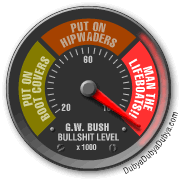Dem coffers outweighing GOP's
From almost any angle, Republicans are facing a Democratic financial tsunami in 2008. In the first six months of this year, Democratic federal candidates and the party's three national committees raised $381 million compared with the $291 million their counterparts collected. That amounts to a $90 million advantage and means that 57 percent of the total raised by all political candidates and committees has gone to the Democrats:

And that's the good news for Republicans.
When the cash on hand is added up for presidential, House and Senate candidates, as well as the party committees, the picture is even bleaker. Overall, Democrats reported having $314 million in cash compared with the Republicans' $190 million, which means that 62 percent of the political cash is now held in Democratic accounts.
What does that mean at political micro-levels? The Democratic Congressional Campaign Committee has a 10-1 cash advantage over its Republican adversary, and the Democratic Senatorial Campaign Committee has a cash advantage that is three times greater than the National Republican Senatorial Committee's take.
The top two Democratic candidates each have nearly as much money in the bank as the combined savings of the entire 2008 Republican field. The 10 Republicans running for president reported a combined total of $36 million cash on hand - Obama has $35 million and Clinton has $33 million available for the primary race.
"I cannot remember a time when the Democrats have had an advantage in the party committees and at the candidate level at the same time," said Michael J. Malbin, executive director of the nonpartisan Campaign Finance Institute.
Certainly, money alone doesn't win elections. Campaign trails leading to the Oval Office and to the lowly House echo with the tales of well-funded campaigns that met early ends. But money does create options, and at this pace, the Democrats see theirs growing, while the Republicans may well be losing some.
Take a look at the House. In January, newly selected DCCC Chairman Chris Van Hollen laid out a plan to defend his vulnerable freshmen while simultaneously attacking Republicans who eked through last November. "If we continue the current pace, we will have the resources to fully support that strategy," he said. Meanwhile, Rep. Tom Cole, who heads the National Republican Congressional Committee, started the year with quite a different set of priorities: Pay off the committee's debt and then start tucking money away for the campaign season.
Cole has made good on his promise. The committee has raised $29 million and spent $27 million. Today, it has got $2 million in the bank and $4 million in debts outstanding, according to its reports. Cole seems on track to move the committee's balance from red to black by year's end.
But that's when the hard slog begins, because the Democrats' edge isn't just the byproduct of high energy within their ranks. The long-feared Republican fundraising machine also appears to be in decline. While the Republican National Committee has maintained its dominance over the Democratic National Committee, raising $45 million to the DNC's $27 million, even that edge is on the lower end of historic patterns.
And consider this: When President Bush was running for reelection in 2004, his appearance at the RNC's annual spring gala raised $38.5 million. During last year's congressional campaign season, the presidential gala raised $17 million. This year, it raised $10.5 million.
In addition, the loss of control of Congress has stripped Republicans of one of their most lucrative fundraising assets: committee chairmanships. According to a Center for Inquiry study released last week, corporate donors have made a seismic shift since January toward the new Democratic chairmen. In the first six months of this year, political action committees donated $41 million to Democrats, compared with $24 million for Republicans. During the previous year, Republicans received $32 million in PAC contributions, compared with $22 million for the Democrats, the report concluded.
The presidential campaign season also looms as an obstacle to congressional fundraising. In private conversations, Republican fundraising experts dismiss the yawning gap between their primary field and the Democrats' roster. "When the nominee becomes clear, he will have all the resources he needs," said one longtime Republican operative.
History supports that notion. After scraping through hard times in the 2003 Democratic primary, John Kerry found himself flush with cash, even matching the Bush-Cheney machine, when he swept the Iowa and New Hampshire primaries.
But that gush of money does not automatically extend to the congressional committees. Van Hollen said he spends plenty of time these days warning donors: "Do not take the House for granted. Things can change quickly."
Even if the money rolls in, managing it frugally can be crucial. In the 2006 cycle, the Republican House committee raised more than the Democrats. What both sides said helped tip the scales in many races was that the Democrats outspent the Republicans in the final weeks of that contentious campaign cycle.
How did they manage that? . . .they had more cash in the bank.
Labels: 2008, campaign finance













4 Comments:
That's fantastic news for working-class people who mistakenly believe the Democratic Party still represents them.
The Republicans have done this to themselves. While corruption isn't limited to their party, it certainly is running rampant there now.
All of those appointees from the good old boy network...
This is just another indicator how angry the American people are at the Republican party and how sick they are of their corruption. The country is ready for a change and if the Dems can't win a total majority in 2008 than something in very very wrong with our party. Hopefully this trend will continue.
I can't see why any Repug would donate to the neocon party, unless they are desperate.
Post a Comment
<< Home